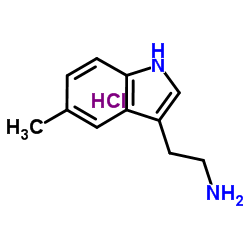5-甲基色胺盐酸盐

5-甲基色胺盐酸盐结构式

|
常用名 | 5-甲基色胺盐酸盐 | 英文名 | 5-Methyl-1H-indole-3-ethylamine monohydrochloride |
|---|---|---|---|---|
| CAS号 | 1010-95-3 | 分子量 | 210.703 | |
| 密度 | 1.126g/cm3 | 沸点 | 355.3ºC at 760mmHg | |
| 分子式 | C11H15ClN2 | 熔点 | 289-292ºC (dec.) | |
| MSDS | 美版 | 闪点 | 195.9ºC |
|
Transmembrane signaling through phospholipase C in cortical and hippocampal membranes of psychogenetically selected rat lines.
Psychopharmacology 154(2) , 115-25, (2001) One of the major pathways for neurotransmitter signaling involves phosphoinositide-specific and G-protein-dependent phospholipase C-beta (PLC-beta), which stimulates the formation of inositol 1,4,5-trisphosphate and diacylglycerol. Serotonergic and muscarinic... |
|
|
Characterization of eight biogenic indoleamines as substrates for type A and type B monoamine oxidase.
Biochem. Pharmacol. 30(11) , 1353-8, (1981)
|
|
|
Comparison of serotoninergic to muscarinic cholinergic stimulation of phosphoinositide-specific phospholipase C in rat brain cortical membranes.
J. Pharmacol. Exp. Ther. 255(3) , 1296-300, (1990) Stimulation of phosphoinositide-specific phospholipase C (PLC) by muscarinic cholinergic and serotoninergic agonists was measured in rat brain cortical membranes by using exogenously supplied substrates. Serotonin, tryptamine, 5-fluorotryptamine and 5-methylt... |
|
|
5-Methyltryptamine stimulates phospholipase C-mediated breakdown of exogenous phosphoinositides by blowfly salivary gland membranes.
J. Biol. Chem. 260(30) , 16052-5, (1985) 5-Methyltryptamine, through a GTP-dependent mechanism, stimulated breakdown of endogenous [3H]inositol-labeled phosphoinositides in membranes prepared from blowfly salivary gland homogenates through a phospholipase C exhibiting a pH optimum of approximately 7... |
|
|
SC-53606, a potent and selective antagonist of 5-hydroxytryptamine4 receptors in isolated rat esophageal tunica muscularis mucosae.
J. Pharmacol. Exp. Ther. 266(3) , 1339-47, (1993) (1-S,8-S)-N-[(hexahydro-1H-pyrrolizin-1-yl)methyl]-6-chloroimi+ ++- dazo[1,2-a]pyridine-8-carboxamide hydrochloride (SC-53606) acts as an antagonist of 5-hydroxytryptamine4 (5-HT4) receptor-mediated relaxation of carbachol-induced contractions in rat esophage... |
|
|
Further evidence that the guinea pig tracheal contractile serotonergic receptor is a 5-hydroxytryptamine2 receptor: use of 5-methyltryptamine and dipropyl-5-carboxamidotryptamine.
J. Pharmacol. Exp. Ther. 264(1) , 271-5, (1993) The guinea pig tracheal contractile serotonergic receptor shows pharmacological similarity to both 5-hydroxytryptamine2 (5-HT2) and 5-hydroxytryptamine1C (5-HT1C) receptors. The present in vitro study utilizes 5-methyltryptamine (5-MT), a high-affinity 5-HT1C... |
|
|
5-Methyltryptamine decreases net accumulation of 32P into the polyphosphoinositides from [gamma-32P]ATP in a cell-free system from blowfly salivary glands. Activation of breakdown of the newly synthesized [32P]polyphosphoinositides.
J. Biol. Chem. 261(2) , 638-43, (1986) Incubation of blowfly salivary gland homogenates with 30 microM [gamma-32P]ATP resulted in a rapid, Mg2+-dependent, synthesis of [32P]polyphosphoinositides and [32P]phosphatidic acid. 5-Methyltryptamine, in the presence of 10 microM guanosine 5'-(3-O-thio)tri... |
|
|
Inhibition of ionic transport and ATPase activities by serotonin analogues in the isolated toad lens.
Biochim. Biophys. Acta 602(2) , 389-400, (1980) The effects of serotonin and five other indoles were tested on the electrical parameters and ionic transport in the isolated toad lens. Serotonin, tryptophan and 5-hydroxy-L-tryptophan did not affect the electrical parameters of the lens at concentrations as ... |
|
|
Serotonin-induced contraction in canine coronary artery and saphenous vein: role of a 5-HT1D-like receptor.
Life Sci. 54(22) , 1671-80, (1994) The identity of the serotonin (5-HT) receptor(s) that mediate(s) contraction in canine coronary artery and saphenous vein remains controversial. Ring segments of endothelium-denuded coronary artery and helical strips of saphenous vein were suspended in organ ... |
|
|
5-Fluorotryptamine is a partial agonist at 5-HT3 receptors, and reveals that size and electronegativity at the 5 position of tryptamine are critical for efficient receptor function.
Eur. J. Pharmacol. 580(3) , 291-7, (2008) Antagonists, but not agonists, of the 5-HT3 receptor are useful therapeutic agents, and it is possible that partial agonists may also be potentially useful in the clinic. Here we show that 5-fluorotryptamine (5-FT) is a partial agonist at both 5-HT3A and 5-HT... |